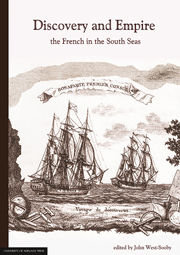Book contents
- Frontmatter
- Contents
- List of Figures
- List of Contributors
- Acknowledgements
- Introduction
- Note on the Second Frank Horner Lecture
- 1 The Globe Encompassed: France and Pacific Convergences in the Age of the Enlightenment
- 2 The Abbé Paulmier's Mémoires and Early French Voyages in Search of Terra Australis
- 3 The Acquisitive Eye? French Observations in the Pacific from Bougainville to Baudin
- 4 Discovering the Savage Senses: French and British Explorers' Encounters with Aboriginal People
- 5 A Case of Peripheral Vision: Early Spanish and French Perceptions of the British Colony at Port Jackson
- 6 New Creatures Made Known: Some Animal Histories of the Baudin Expedition
- 7 “Primitive race”, “pure race”, “brown race”, “every race”: Louis Freycinet's Understanding of Human Difference in Oceania
- 8 Imperial Eyes on the Pacific Prize: French Visions of a Perfect Penal Colony in the South Seas
1 - The Globe Encompassed: France and Pacific Convergences in the Age of the Enlightenment
Published online by Cambridge University Press: 05 April 2014
- Frontmatter
- Contents
- List of Figures
- List of Contributors
- Acknowledgements
- Introduction
- Note on the Second Frank Horner Lecture
- 1 The Globe Encompassed: France and Pacific Convergences in the Age of the Enlightenment
- 2 The Abbé Paulmier's Mémoires and Early French Voyages in Search of Terra Australis
- 3 The Acquisitive Eye? French Observations in the Pacific from Bougainville to Baudin
- 4 Discovering the Savage Senses: French and British Explorers' Encounters with Aboriginal People
- 5 A Case of Peripheral Vision: Early Spanish and French Perceptions of the British Colony at Port Jackson
- 6 New Creatures Made Known: Some Animal Histories of the Baudin Expedition
- 7 “Primitive race”, “pure race”, “brown race”, “every race”: Louis Freycinet's Understanding of Human Difference in Oceania
- 8 Imperial Eyes on the Pacific Prize: French Visions of a Perfect Penal Colony in the South Seas
Summary
Divergence and Convergence in World History
Divergence and convergence—these are the two great tidal movements which have shaped human history. From the remote origins of humankind in Africa, the history of humankind was largely characterised by divergence, with the history of the great Polynesian diaspora into the uncharted seas of the Pacific forming the last major chapter of this great scattering of humanity. This great outward wave of human settlement found its furthest shore with the settling of New Zealand around the period 1000–1200 AD. But this was also the period when the tide of human outward settlement began to recede, drawing together an increasing number of peoples and cultures which had once existed in relative isolation. As Northrup, to whose 2005 article I am indebted for this way of looking at world history (along with the recent works by the McNeills and Fernandez-Armesto), argues, from 1000 onwards we are increasingly in an age of convergence as different societies were more and more linked together in what eventually became a global network. In Europe, for example, from the time of the First Crusade of 1096–1099, Europe was in increasing, if belligerent, contact with its Islamic neighbours and its contact with a still wider world grew as the rapid expansion of the Mogul Empire in the thirteenth century drew together chains of connection that stretched to the Far East.
- Type
- Chapter
- Information
- Discovery and EmpireThe French in the South Seas, pp. 17 - 40Publisher: The University of Adelaide PressPrint publication year: 2013



